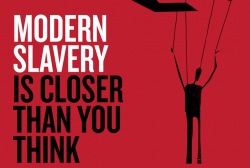 Abraham Lincoln
If given the truth, the people can be depended upon to meet any national crisis...
Abraham Lincoln
If given the truth, the people can be depended upon to meet any national crisis...
 Guildford news...
for Guildford people, brought to you by Guildford reporters - Guildford's own news service
Guildford news...
for Guildford people, brought to you by Guildford reporters - Guildford's own news service
Opinion: Guildford Must Help in The Fight Against The Spreading Plague Of Modern Slavery
Published on: 9 Dec, 2019
Updated on: 10 Dec, 2019

Cllr James Walsh
By Cllr James Walsh
Labour borough councillor for Stoke
There is a pernicious, growing disease spreading across the UK, infecting every city and hundreds of towns and villages across the country.
Modern slavery is a cancer on the underbelly of the economy and our society. Across the world, vulnerable people of both sexes, all ages and all ethnicities are being trafficked and forced to work in legitimate and illegitimate jobs, from drugs farms to prostitution and construction, from agriculture and gambling to the service industries.
 With 28 incidents recorded in Surrey in 2016, 49 in 2017, 72 in 2018 and at least 115 in the past year, the surge is worrying. This so-called “hidden crime” is on the increase, more people are being exploited and we have detected only a fraction of it.
With 28 incidents recorded in Surrey in 2016, 49 in 2017, 72 in 2018 and at least 115 in the past year, the surge is worrying. This so-called “hidden crime” is on the increase, more people are being exploited and we have detected only a fraction of it.
Months ago, The Guardian reckoned that an estimated 13 million people were enslaved between the 15th and 19th centuries at height of the transatlantic trade. Today, an estimated 40 million people worldwide are living in some form of slavery, with 71% of victims women or girls and 10 million children.
 In today’s Britain, more than 136,000 people are suspected of living in modern slavery, up 113,000 between the period we have figures for in 2013 and 2016. This is very likely just the tip of the iceberg.
In today’s Britain, more than 136,000 people are suspected of living in modern slavery, up 113,000 between the period we have figures for in 2013 and 2016. This is very likely just the tip of the iceberg.
These vulnerable people are being coerced into working for little or no money, gangmasters extracting exorbitant fees and charging rents that chain them into a state of bondage and forced servitude.
We can help combat this disgraceful situation by reporting concerns we may have in our neighbourhoods or by legislating to prevent criminals from tightening their grip on the most vulnerable.
Last week, the Labour group tabled a motion at Guildford Borough full council to make GBC join 50 other councils, including Surrey County Council, in signing the Charter Against Modern Slavery.
By signing, the council can ensure the money it spends on services is not going into the pockets of slavers, either directly or indirectly through its supply chains.
The charter pledges councils to take a proactive approach, training their procurement teams to understand the problem in its many forms, to make sure contractors comply with the 2015 Modern Slavery Act and to investigate any unusually low-cost tenders.
Recent Articles
- Letter: This Shows Why Councils Should Not Dabble in Property Investment
- GBC Dismisses Fears That New Ash Road Bridge Will Cause Traffic ‘Bottleneck’
- Marking Holocaust Memorial Day 2025 at the Surrey History Centre
- Surrey Councils Call on Residents to Recycle All Their Food Waste
- Windfall Grant Allows High Street Redevelopment Project to Proceed
- New Crossing at Burpham
- Young Councillor Quits Tories for Reform
- Surrey Police Crackdown Shows Serious Rise In Drug-Driving
- Letter: Too Many Years Have Been Lost Awaiting This Decision
- Guildford’s First “Living School Gate” Delivers Major Health and Environmental Benefits


Search in Site
Media Gallery
Dragon Interview: Local Artist Leaves Her Mark At One of England’s Most Historic Buildings
January 21, 2023 / No Comment / Read MoreDragon Interview: Lib Dem Planning Chair: ‘Current Policy Doesn’t Work for Local People’
January 19, 2023 / No Comment / Read MoreA3 Tunnel in Guildford ‘Necessary’ for New Homes, Says Guildford’s MP
January 10, 2023 / No Comment / Read More‘Madness’ for London Road Scheme to Go Ahead Against ‘Huge Opposition’, Says SCC Leader
January 6, 2023 / No Comment / Read MoreCouncillor’s Son Starts Campaign for More Consultation on North Street Plan
December 30, 2022 / No Comment / Read MoreCounty Council Climbs Down Over London Road Works – Further ‘Engagement’ Period Announced
December 14, 2022 / No Comment / Read MoreDragon Interview: GBC Reaction to the Government’s Expected Decision to Relax Housing Targets
December 7, 2022 / No Comment / Read MoreHow Can Our Town Centre Businesses Recover? Watch the Shop Front Debate
May 18, 2020 / No Comment / Read More










Recent Comments